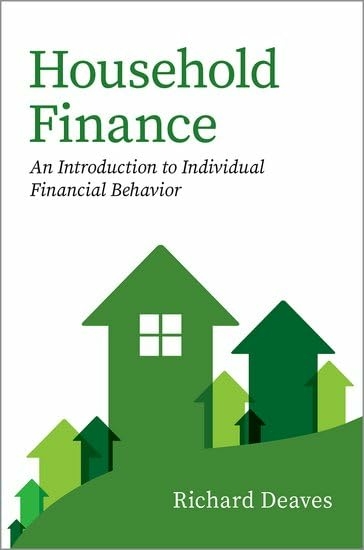
Household Finance
Oxford University Press Inc (Verlag)
978-0-19-769985-0 (ISBN)
Author Richard Deaves covers the broad range of choices and goals in household finance both in the normative sense (i.e., what is best) based on conventional financial theory and in the positive sense (i.e., what is actually done) based on observing actual behavior. While modern finance builds models of behavior and markets based on strong assumptions such as the rationality of decision-makers, behavioral finance is based on the view that sometimes people behave in a less-than-fully-rational fashion when making financial decisions. Deaves addresses important issues and puzzles in the field such as financial illiteracy, whether education and advice can improve outcomes, intertemporal consumption optimization, consumption smoothing, optimal dynamic risk-taking, the stock market participation puzzle, the credit card debt puzzle, anomalous insurance decisions, mortgage choices, skewness preference, investments driven by availability and attention, local and home bias, the disposition effect, optimal pension design and improving outcomes through nudging in a thoroughly international approach.
Richard Deaves is professor emeritus of Finance at the DeGroote School of Business, McMaster University, Hamilton, Canada. Elsewhere, he has addressed groups of students and executives at various universities in Canada, the U.S., South America, Europe and the Far East. His research has been published extensively, appearing in such prestigious journals as the Journal of Financial and Quantitative Analysis, the Review of Finance, the Journal of Monetary Economics and the Journal of Banking and Finance. Most of his recent research deals with issues in household, behavioral and experimental finance. He has also published on such issues as the performance of investment funds; market efficiency; modeling interest rates; and pricing, efficiency and hedging in futures markets. His consulting experience has spanned such topics as investor behavior; pension design; hedging in the energy industry; the predictability of interest rates; real options and capital budgeting; and security valuation. He has served as an expert in numerous regulatory and legal proceedings. His work has been profiled in such international media outlets as CNN, Newsweek and Der Spiegel. He has also been affiliated with the Centre for European Economic Research (ZEW) in Mannheim, Germany.
INTRODUCTION: BEHAVIOR
CHAPTER 1: ECONOMICS
CHAPTER 2: PSYCHOLOGY
CHAPTER 3: TIME
CHAPTER 4: RISK
CHAPTER 5: LOSS
CHAPTER 6: PLANNERS
CHAPTER 7: SAVERS
CHAPTER 8: ALLOCATORS
CHAPTER 9: RISK TAKERS
CHAPTER 10: HEDGERS
CHAPTER 11: DEBTORS
CHAPTER 12: INVESTORS
CHAPTER 13: PERFORMERS
CHAPTER 14: DELEGATORS
CHAPTER 15: FOLLOWERS
CHAPTER 16: CONCLUSION: LESSONS LEARNED
| Erscheinungsdatum | 21.05.2024 |
|---|---|
| Verlagsort | New York |
| Sprache | englisch |
| Maße | 156 x 235 mm |
| Gewicht | 1670 g |
| Themenwelt | Sachbuch/Ratgeber ► Beruf / Finanzen / Recht / Wirtschaft ► Geld / Bank / Börse |
| Wirtschaft ► Volkswirtschaftslehre ► Mikroökonomie | |
| ISBN-10 | 0-19-769985-5 / 0197699855 |
| ISBN-13 | 978-0-19-769985-0 / 9780197699850 |
| Zustand | Neuware |
| Informationen gemäß Produktsicherheitsverordnung (GPSR) | |
| Haben Sie eine Frage zum Produkt? |
aus dem Bereich


